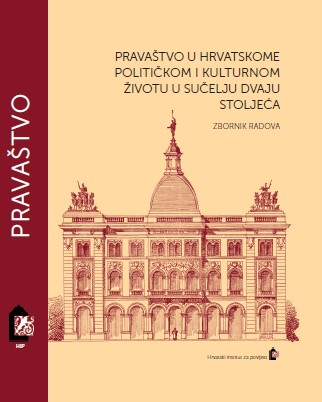Pravaški župnik Juraj Tomac i seljački vođa Stjepan Radić: prilog povijesti jedne borbe za hrvatsko seljaštvo
‘Rightist’ priest Juraj Tomac and peasant leader Stjepan Radić: a contribution to the history of a struggle for the Croatian peasantry
Author(s): Ivica Miškulin
Subject(s): Political history, Government/Political systems, Political behavior, Politics and religion, Politics and society, Pre-WW I & WW I (1900 -1919), Inter-Ethnic Relations
Published by: Hrvatski institut za povijest
Keywords: Juraj Tomac; Stjepan Radić; Croatian peasantry; republicanism; clericalism;
Summary/Abstract: The conflict between Juraj Tomac and Stjepan Radić analyzed in this text had many causes. The first and foremost was determined by their various parties’ differing views of the place and role of the peasantry in political and public life. To the followers of Josip Frank, regardless of what their party was formally called, the Croatian peasantry was only one class within the Croatian nation and it was indivisible from the whole of the Croat political people. Certainly, due to its difficult political and social situation it required particular attention. To the Radić brothers, especially the younger Stjepan, the peasantry was the most important class of the Croatian people, to which, because of its national consciousness and numerical majority, the leading role belonged. Indeed, because of this the Catholic priest Juraj Tomac most oft en pointed out the negative consequence to which this principle of Radić’s could logically lead, a weakening of the ‘Rightist’s’ main goal, that is, the unification and independence of the Croatian lands. An important difference also existed between these men in terms of their views on the political and legal position of the Serbs in the Croatian lands: Tomac often criticized what he felt were Radić’s naïve views on Slavic and South Slavic reciprocity, in which he saw the opportunity for Serbian expansionism. In Monarchist Yugoslavia both of the men found themselves in the same situation, as a result of which Tomac demonstrated his preparedness to recognize the growth in power of Radić’s party. Similarly, Tomac, unlike Radić, demonstrated a higher degree of commitment to his political principles, which was especially obvious after Radić recognized the Monarchy officially. Radić’s pragmatic use of attacks against clericalism was likewise criticized by Tomac; in it he saw nothing more than yet another naïve attempt by Radić to rely on Slavic reciprocity in an attempt to weaken his political opponents. The preference of the Croatian peasantry, mostly because of reasons Tomac could in no way have an influence on, fell on Radić and his party.
Book: Pravaštvo u hrvatskome političkom i kulturnom životu u sučelju dvaju stoljeća
- Page Range: 329-357
- Page Count: 29
- Publication Year: 2013
- Language: Croatian
- Content File-PDF

